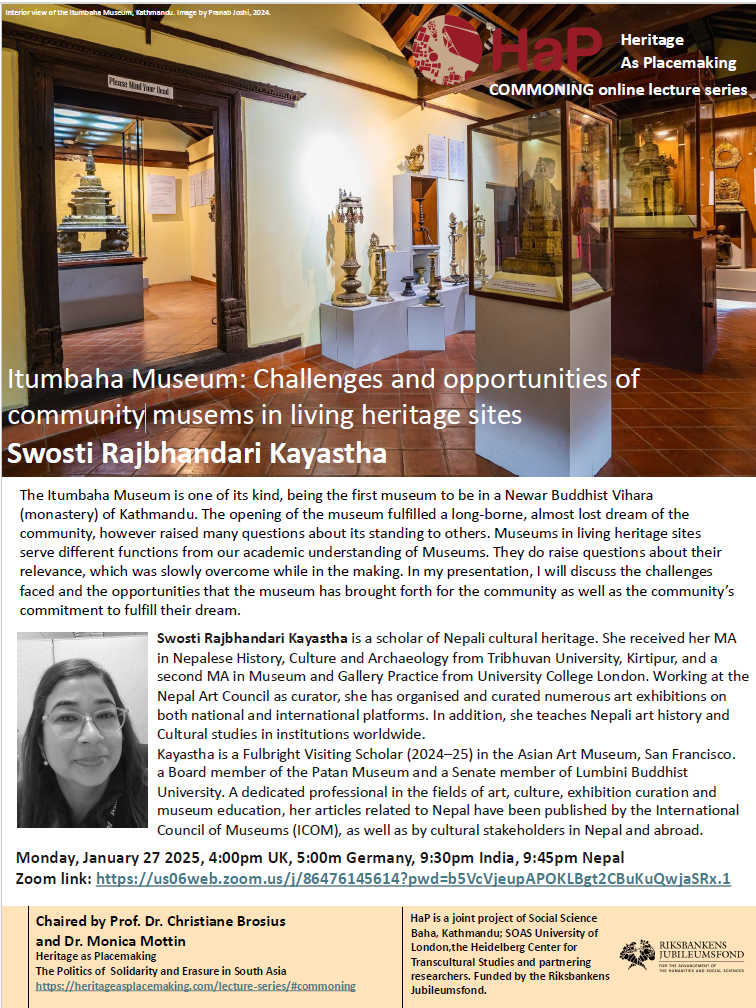Activities
HAP Public Lecture Series
Lecture: Monday, January 27, 2024
Itumbaha Museum: Challenges and opportunities of community museums in Living Heritage Sites
Swosti Rajbhandari Kayastha
8:00 San Francisco / 16:00 UK /17:00 Germany / 21:30 India / 21:45 Nepal - online
Abstract: The Itumbaha Museum is one of its kind, being the first museum to be in a Newar Buddhist Vihara (monastery) of Kathmandu. The opening of the museum fulfilled a long-borne, almost lost dream of the community, however raised many questions about its standing to others. Museums in living heritage sites serve different functions from our academic understanding of museums. They do raise questions about their relevance, which was slowly overcome while in the making. In my presentation, I will discuss the challenges faced and the opportunities that the museum has brought forth for the community as well as the communities commitment to fulfill their dream.
Swosti Rajbhandari Kayastha is a scholar of Nepali cultural heritage. She is a Fulbright Visiting Scholar (2024-25) in the Asian Art Museum, San Francisco, a board member of the Patan Museum and a senate member of Lumbini Buddhist University.
Lecture: Monday, December 9, 2024
Queer heritage-making as a counterhegemonic strategy in Nepal
Dr. Marion Wettstein
Abstract: In recent years, queer communities in South and Southeast Asia increasingly refer to cultural, historical, and religious heritage in order to seek social acceptance or political recognition. In this talk, I take a look at current queer heritage-making processes in Nepal. On the one hand, alternative narratives of religious and cultural heritage are foregrounded by well-known Nepalese protagonists of the queer community, especially for symbolical politics and tourist economy. However, locally this recourse to cultural heritage is also contested, and there are other queer voices in Nepal that prefer to delink queerness from notions of cultural heritage. This talk thus provides a glimpse at a highly dynamic social process that is currently negotiated in Nepal between different groupings of the queer community as to whether to employ local cultural heritage as a counterhegemonic strategy or not.
Dr. Marion Wettstein is currently postdoctoral research fellow at Heidelberg Centre for Transcultural Studies (HCTS).
Lecture: Monday, November 11, 2024
Who cares about India's modern architectural heritage?
Prof. Dr. Nadja-Christina Schneider
Abstract: The razing of the Hall of Nations in Delhi in April 2017 was condemned by architects and historians, not only because of the loss of an important piece of India’s modern architectural heritage, but also the clandestine way in which the demolition was conducted. In response to an urgent appeal for the preservation of the iconic building, the Delhi High Court stated that buildings younger than sixty years could not be given the status of architectural or cultural heritage. However, if the recent past is discounted as heritage in a monument-centric approach, architect Prem Chandavarkar argues that the built heritage is reduced to a qualifying age, and this means that future generations will only be able experience and learn about the modern heritage which escaped ongoing demolition or for which at least an archive has been created to preserve the architectural memory. This will also complicate the task of communicating the contribution of non-Western societies like India’s to global modern architecture. The talk therefore looks at two questions: How do architecture enthusiasts and historians try to convey the relevance of a public debate on the modern built heritage beyond the community of experts? And what could be possibilities for opening this discussion and involving new knowledge actors in a collective search for equitable approaches to modern heritage?
Prof. Dr. Nadja-Christina Schneider is a professor of Gender and Media Studies for the South Asian Region (GAMS) at Humboldt-Universität zu Berlin.
Lecture: Monday, October 21, 2024
Experiments in commoning ethnography
Dr. Eli Elinoff and Dr. Lorena Gibson
Abstract: What are the boundaries and limits of Ethnography as a method? What are kinds of relations compose ethnographic research? Who is included and who is excluded? These are classic questions facing both ethnographers and the diverse research fields in which ethnography has asserted itself as an essential methodology. In this talk, we return to these questions and consider how our journal, Commoning Ethnography (CE), has sought to answer them. Commoning Ethnography is an off-centre, annual, international, peer-engaged, open access, online journal dedicated to examining, criticizing, and redrawing the boundaries of ethnographic research, teaching, knowledge, and praxis. CE now occupies a small niche in the journal ecosystem with its specific approach to not only the work we publish but how we publish it. Having published five issues the journal sits at a crossroads as we seek to reimagine it for the next stage of its life. Here we will talk about how our own research and praxis informed the creation of the journal, what we have learned from developing it, and where we hope to take it next.
Dr. Eli Elinoff is a Senior Lecturer of Cultural Anthropology at Victoria University of Wellington.
Dr. Lorena Gibson is a Senior Lecturer in the Cultural Anthropology Programme at Te Herenga Waka—Victoria University of Wellington.
Lecture: Monday, September 16, 2024
The politics of queer heritage-making in Indonesia: Outcomes, challenges, and alternatives
Click to enlarge the poster
Dr. Wikke Jansen
Recent years have witnessed an increase in social stigmatization and legal discrimination of queer Indonesians. Activists have responded to this backlash in various ways, of which "queer heritage-making," or the impulse to recuperate pre-colonial and Islamic concepts and identities as part of a queer legacy that can be drawn upon for the future, is an important one. At first glance, this strategy seems a fruitful one that helps counter the argument that "queer" comes from the "West" or is "un-Islamic". But what are the pitfalls of trying to find historical precedence for contemporary queer identities such as gay, lesbian, and trans*gender? Who is excluded by this endeavor, and who is put at risk? In this session we will together examine the complex mechanisms and outcomes of "heritage from below" in the context of gender and sexual diversity in Indonesia.
Dr. Wikke Jansen is Assistant Professor of Visual and Media Anthropology at the Heidelberg Centre for Transcultural Studies.
Lecture: Thursday, June 20, 2024
Fighting for streets and ponds: Everyday heritage in times of urban transformation
Sabina Tandukar
Sabina Tandukar
Abstract: Understanding a street is complex when it comes to heritage settlements, where it is not just a network for mobility but an extension of communal and cultural living of commoners. Streets cannot be seen in isolation, but in composition with the cultural infrastructures like phalcha (arcaded platform), hiti (water spouse), jahru (well), dabali (uncovered dance platform), temples, chaityas (buddhist shrine), ponds and in many cases in relation to objects and rituals that come alive in certain periods of the year.
My first case is a street stretch of Sunaguthi, a historic settlement south of Patan. The main street is the focus of a prominent procession and festival of Sunguthi – known as Balkumari Jatra. The festival sees a Yansi – “timber pole” being erected at the exact point, at the center of the street and in front of the temple of Bhringareshwara. Historians believe that such activity in Nepal Mandala often related to the New Year celebration of that time or the founding of the settlement. Besides the erection of the Yansi, the Khat “Palanquin” for the gods to travel through the settlement is also placed at the street in an exact location and in a pre-determined order andare caried in shoulders by the energetic locals through the settlement. What is interesting is tosee how this festival makes its spatial connection with various locations and infrastructuresalong the street. The street turns into a performance stage and people – the ritual actors and observers! Now coming to the point of people’s solidarity in heritage preservation, Sunaguthi marked a positive note in heritage activism in Nepal. With the construction of Kvay Lachi Phalcha which is often expressed as subtle and physical resistance to state oppression in the form of road widening project (that could have erased the identity of the settlement altogether); Sunaguthi has moved ahead and this year made the street vehicle free for the ceremonial festival of Goddess Balkumari. Over the years what is visible is awareness and understanding takes time and people should be given time to discuss and develop understanding of their place.
A phalca in Sunaguthi. Photo courtesy of Sabina Tandukar.
Twin ponds: Nigu Puhku, of Timi. Photo courtesy of Sabina Tandukar.
On a similar note I wand to discuss a second case – the Nigu Pukhu of Thimi. Thimi is another historic settlement to the east of Kathmandu and popular for pottery works. The settlement is oriented north south and the main street runs along this direction almost through the center of the settlement. At the approximate center and to the right of the street is twin ponds known as Nigu Pukhu. The ponds had dried up some 40 years ago when the then King Birendra visited the place and locals in hurry dried the pond to create an arena to welcome the King. Post that activity, many attempts to fill the pond with water had failed. When we were invited by the municipality for revival of the ponds, we saw that it was possible but locals were skeptical about it. Very few youths gathered to revive the ponds. This project is an example of how the skeptical locals are now enjoying the ‘Quality of Life’ with new-found beauty of their own neighborhood as well as progressing ahead with economic benefits too. This clearly explains that at times, people believe only when they see it or feel it. At cases like Nigu Pukhu, local governance was important to make correct decisions and execute them.
Sabina Tandukar is a conservation architect and urban designer based in Kathmandu, Nepal.
Lecture: Monday, July 1, 2024
Newa women as public pedagogues fostering gender-inclusive placemaking in music heritage; a case study of Taḥnani Dāphā Khalaḥ
Pushpa Palanchoke
Pushpa Palanchoke
Abstract: As heritage dominated by men face extinction amidst the rise of cosmopolitan culture, a shift has occurred within the Newa indigenous community of Kathmandu Valley. With young individuals gravitating towards careers in Western education and capitalist frameworks, the question arises: who will uphold the rich musical traditions rooted in history and indigenous knowledge? In response, Dāphā music groups within the Newa community have turned to "settled"—married women. Previously relegated to domestic responsibilities alone, these women are now stepping into the public sphere with a fervor for music-making. They are driving social transformations and forging new identities through their engagement in music. This lecture explores several events (co)organized by Folk Lok and Taḥnani Dāphā Khalaḥ, highlighting the central roles these women play as educative agents and public pedagogues to foster gender-inclusive placemaking within the music heritage practices of the Newa people.
Pushpa Palanchoke Pushpa is an Applied Ethnomusicologist and a Music Educator from Nepal. She is currently a doctoral candidate at Mutri Doctoral School, Sibelius Academy, Helsinki. She is a recipient of Nepal Chatra Vidya Padak and Nepal Vidhya Bhusan (Ga) & (Kha), three highly prestigious national awards in the field of education. She is an academician with interests in gender-inclusive placemaking, rituals, music heritages and sustainability of and through them. She is also an artist—a vocalist and spoken word poet whose stage performance is a blend of melodies she has learned from different indigenous masters, and poetry that tells stories of nature, divine mother, human desires and struggles. She is the mind and heart behind the program Folk Lok. Folk Lok is a community-based arts program focused on the revitalization of indigenous music practices. Between 2020-2023, Folk Lok was supported by the U.S. Embassy’s Book Bus and managed under Satori Centre for the Arts.
A Pikyāu, or music graduation ceremony, for the Khalaḥ musical group takes place in the Kathmandu Valley. Photo courtesy of Pushpa Palanchoke.
Series 2
Erasure (2022–2023)
Chaired by Dr. Stefanie Lotter
In collaboration with Dr. Uma Pradhan (University College London and the Nepal Conversations podcast)
Lecture: Monday, November 27, 2023
Narratives of Ageing, Narratives of Nation-Building: Ralpha and the Legacy of Dissident Poetry in Nepal
Dr. Mallika Shakya
12:00pm UK / 13:00 Germany / 17:30 India / 17:45 Nepal
How do revolutions age alongside humans and nations? Can we read its ageing and memorialising of popular poetry as a project on heritage? This lecture delves into the literary successions embraced by some of the associated poets after the disbanding of Ralpha, a radical collective of poets and musicians that spearheaded poetic and performative protest against the Panchayati dictatorship in the 1960s and 1970s. The subversive body of Ralpha songs continues to resonate in the memories of many Nepalis. A select few of these songs have spontaneously resurfaced and been cited during more recent uprisings in Nepal, particularly those advocating for cultural pluralism and social justice.
While Ralpha songs continue to incite dissent among the new generations of Nepalis today, some of the poets originally associated with the movement have chosen to distance themselves from populist protests, opting instead to poetically pen the aspirations that once fuelled their activism. They now reflect on how those aspirations have been overlooked or intentionally forgotten in contemporary times. I read recent anthologies penned by one of the Ralpha poets, Manjul, to contemplate on the multifaceted and enduring dimensions of dissident poetry’s heritage in Nepal. This lecture situates this body of work within the ongoing anthropological discussions surrounding the epistemologies of writing culture. It seeks to build on the evocative power of poetry to stir conceptual conversations about nationalism, belonging and the passage of time.
Dr. Mallika Shakya is a Senior Assistant Professor in the Department of Sociology at South Asian University. Her work is interested in the social embedding of industrialization in capital cities and border towns and the poetic imagination of nation and border in South Asia. Her writing has been published in leading academic journals, and her monograph “Death of an Industry: The Cultural Politics of Garment Manufacturing during the Maoist Revolution in Nepal” was published by Cambridge University Press in 2018. Dr. Shakya also serves on the editorial committees of three journals: Dialectical Anthropology, the European Bulletin of Himalayan Research (EBHR) and Society and Culture in South Asia (SCSA).
Lecture: Monday, October 16, 2023
Seduction of the old city of Srinagar: An enquiry into competing narratives of belonging
Dr. Arshi Javaid
11:00 UK/12:00 Germany / 15:30 India / 15:45 Nepal / online
The old city of Srinagar is witnessing massive political and social transformations, influenced by both the state and private sector. The heightened change threatens the fragile architecture, infrastructure, ownership, demographic composition and lived heritage of the city. Like other cities, the old city of Srinagar is not only a spatially bounded geographical cluster but also a cluster of social and political networks of varying intensity.
The city's challenges are manifold, motivated mainly by the top-down political designs and an enforced developmental perspective to remodelling the city. The restructuring led to significant economic and social changes. Some of them are the advent of deregulation, a massive crackdown by the state, and the crisis of social contracts, leaving many social groups on their own. Hence, the phenomenon garners social visibility and produces competing strands of belonging. This talk will lay out the varied narratives of belonging and the specific politics attached to each. I will further interrogate what the differing sets of belonging mean to the city.
Dr. Arshi Javaid is an Einstein Junior Scholar at Humboldt Universität zu Berlin. Her current research project focuses on creating a memory archive of the old city of Srinagar in the Kashmir Valley. Her previous work has looked at experiences of “everydayness” of Kashmiri Muslims and Kashmiri Pandits before 1989, while her PhD examined civic and ethnic dimensions of Kashmiri nationalism. Dr. Javaid’s broader research interests include gender, violence and conflict in South Asia, and conflict and memory.
Lecture: Monday, June 19, 2023
Fabrication and Fragmentation: Nepal’s Memory Palace
Prof. Bryony Whitmarsh
1pm UK (2pm Germany; 5:30pm India; 5:45pm Nepal; 8am Eastern Standard Time - Toronto) / online
Image poster (click to expand)
Opened to much fanfare after the political transition that ended Nepal’s 239 yr-old Shah monarchy in 2008, the Narayanhiti Palace Museum stands in the centre of Kathmandu, Nepal as a site that is both present and disempowered. Whilst a desire to protect and preserve are understood as fundamental tenets of heritage practice, I argue that the intention behind those who authorised the museumization of the palace was to rather to fix a particular way of remembering (and forgetting) Nepal’s royal past, a process that involved both fabrication and destruction. As the initial moment of the transition from monarchy to republic recedes further into the past, I explore the processes that consigned the palace to the past. I argue that the creation of narratives of loss aimed to create cohesion through the reimagination of collective memory and explore deliberate acts of destruction and reconstruction that have created the conditions for the palace to become a site of investigation for the Nepali nation and that facilitate the transformation of this heritage site into a tourist attraction. Join me as I explore the material practices that take place behind-the-scenes at the Palace Museum.
Bryony Whitmarsh is a Professor of Heritage and Museum Studies within the Department of Archaeology at the University of Southampton and joined the Higher Education sector following a career in museums, bringing with her a wide range of experience including curation, learning, museum outreach and interpretation. As Co-Chair of the University of Portsmouth’s Heritage Hub, she played a key role in building sustainable partnerships and enabling community heritage work. Currently working as Associate Dean International for the Faculty of Arts and Humanities my teaching focused on the historiography of architecture and interior design (with a particular emphasis on a global history of architecture), material culture and museology. Her PhD at the School of Oriental and African Studies (University of London) offers an account of the creation of a heritage site, based on ethnographic fieldwork at the Narayanhiti Palace Museum in Kathmandu, Nepal.
Lecture: Monday, May 8, 2023
Let’s Make a List: How to Get Things Done with Words in Newar Religious Practice
Dr. Christoph Emmrich
1pm UK (2pm Germany; 5:30pm India; 5:45pm Nepal; 8am Eastern Standard Time - Toronto) / online
Rites are made, among other things, of things. Rites among the Newar Buddhists and Hindus of the Kathmandu Valley are big and hence require all kinds of things—and lots of them. It is hence not surprising that only few people are able to keep track of what is needed for which particular rite and for when it is needed—particularly when the date is close and there is still so much to do. For that, Newars, just as people elsewhere, use lists. Rites, hence, are not only made out of things, they are made from lists. What do these lists look like? What do they cover? How are they drawn? How are they used? How do they contribute to making the rite happen? And how do they help us understand better how texts, images, speech, human interaction, and the understanding of what rites are meant to accomplish work together? This lecture will provide a close reading of some of these lists, both textual and visual, share observations on their use in the exchanges between the main actors working towards making ritual happen, such as the family priest, the organizer, or her collaborators, and the vendor, and will attempt to provide insights into crucial creative activities in the run-up to the eagerly anticipated ritual event.
Christoph Emmrich is a Newarologist, Burmologist, Jainologist, and Associate Professor of Buddhist Studies at the University of Toronto, where he has been teaching Newar, Burmese, Pali, Buddhist, and Jain Studies since 2006. When he does not teach, he divides his time between Lalitpur among the Newars, Mawlamyine and Mandalay among the Mons and Burmese, and Pondicherry among the Tamil Jains, conducting research on rites and ritual literature, shop-keeping, and list-making, as well as poetry, textual practice, and temple management.
His latest monograph Writing Rites for Newar Girls. Marriage, Mimesis, and Memory in the Kathmandu Valley is forthcoming with Brill. His publications include “’I Don't Want a Wife without Ear Cuffs’”: Jewels, Gender, and the Market among the Newars of Nepal." Buddhist Jewels, edited by Vanessa R. Sasson, pp. 112-153. Honolulu: University of Hawai’i Press, 2021; “What Theravāda Does. Thoughts on a Term from the Perspective of Post-Colonial Nepal,” in Theravāda Buddhist Modernities. Theravāda Buddhist Civilizations, edited by Juliane Schober and Steven Collins (London: Routledge, 2017), and “Vessantara Opts Out: Newar Versions of the Tale of the Generous Prince,” in Readings of the Vessantara Jātaka, edited by Steven Collins (New York: Columbia University Press, 2017).
Lecture: Monday, March 27, 2023
The politics of erasure: Language, place and ideology in Nepal
Dr. Prem Phyak
12:00 GMT (13:00 CET; 16:30 IST; 16:45 NPT; 19:00 Hong Kong) / online
Language plays a critical role in the construction of the identities of place and people. Taking language as a political construct, this talk builds on the notion of ‘erasure’ (Irvine & Gal, 2000) to examine how state policies have erased multilingualism and promoted homogeneity supporting unequal power relations among languages. Dr. Phyak discusses the historicity of the erasure by analyzing the state policies and their role in shaping the place and public imaginations about the values of indigenous languages. He discusses textual, anecdotal, ethnographic, and linguistic landscape data from school and the public spheres to unpack ideological meanings of the erasure at different times, spaces, and scales.
Dr. Prem Phyak is an assistant professor at the Chinese University of Hong Kong. His research interests include language policy, language ideology, social justice, and decolonial theories. He has published numerous papers in different international journals.
Lecture: Monday, February 13, 2023
Reclaiming Nepal’s Heritage
Roshan Mishra
13:00 GMT (14:00 CET; 18:30 IST; 18:45 NPT) / online
This presentation highlights how the Nepal Heritage Recovery Campaign began, what it has done so far to reclaim Nepal’s cultural properties, and why it is important to the community. The talk will go over the campaign's successes, challenges, and a few examples of cases we have dealt with over the last two years.
Roshan Mishra is the Director of Taragaon Museum and a Kathmandu-based visual artist. He oversees the Nepal Architecture Archive (NAA), which is run by the Saraf Foundation for Himalayan Traditions and Culture, a Taragaon Museum patron organisation. Roshan is also the founder of Global Nepali Museum, Nepalian Art, and an initiator of the Mishra Museum, as well as a visiting faculty member at the Kathmandu University, Art and Design. Roshan is now actively involved in the Nepal Heritage Repatriation campaign (NHRC) to bring back Nepali lost and stolen heritage.
Lecture: Thursday, Nov. 3, 2022
Flowers of love in Western Tamang song traditions
Prof. Kathryn March
13:00 GMT (14:00 CET; 18:30 IST; 18:45 NPT) / SOAS University of London, Room BG01/ and online
Tamang are prodigious composers and performers of song, in both their eastern and western traditions. These traditions have been responding to new contexts of Nepali nationalism and Radio Nepal, the ethnic revitalization movements of the 1990s, and globalization and wage out migration with great creativity and vigor. This presentation looks particularly at the Western Tamang dancing and ripost songs known as Mhendomaya (‘Flowers of love’) to explore both continuity and change in this vibrant song tradition. Examples come from fieldwork in village, national, and international contexts, and from time frames ranging from 1975 to the present.
Kathryn March is Professor Emerita at Cornell University’s Department of Anthropology. Her research foci include gender and social change in Himalayan Asia, the political and economic pressures on local ethnic communities, and the study of ritual, religion, and song as both reflective of individual experience and larger cultural and aesthetic frameworks.
Placemaking and Methods of Urban Research in South Asia
Prof. Nihal Perera
Thursday, February 29, 2024
9:15 am–11:00 am
Sociology Classroom ES 005, South Asian University, New Delhi (on-site)
Click to expand
Space is central to society. Per mainstream discourse, social space is largely produced by the state and by capital. Nihal Perera’s work takes issue with this preconception and addresses the colossal gap left by the leaders in the field of social production of space, including Henri Lefebvre and David Harvey. As his People’s Spaces (Routledge 2016) demonstrates, the adaptation, interpretation, transformation, and creation of spaces are also carried out by ordinary people. He will demonstrate how subjects reconcile the difference between the intended goals of imposed/provided spaces and ordinary people’s own expectations of these, creating spaces for their daily activities and cultural practices. At the other end, the spaces ordinary people produce make the state and capital negotiate their needs.
Adopting an inside-out perspective, empathic to the subjects, Professor Perera will argue that the vast terrain of ordinary actors and spaces which are currently marginalized must be reflected in academic debates and policy decisions and that the local thinking processes that constitute these spaces need to be acknowledged, enabled, and critiqued. For this, he will demonstrate that we need to adopt intellectual approaches grounded in local communities, paying attention to local norms and interpretations.
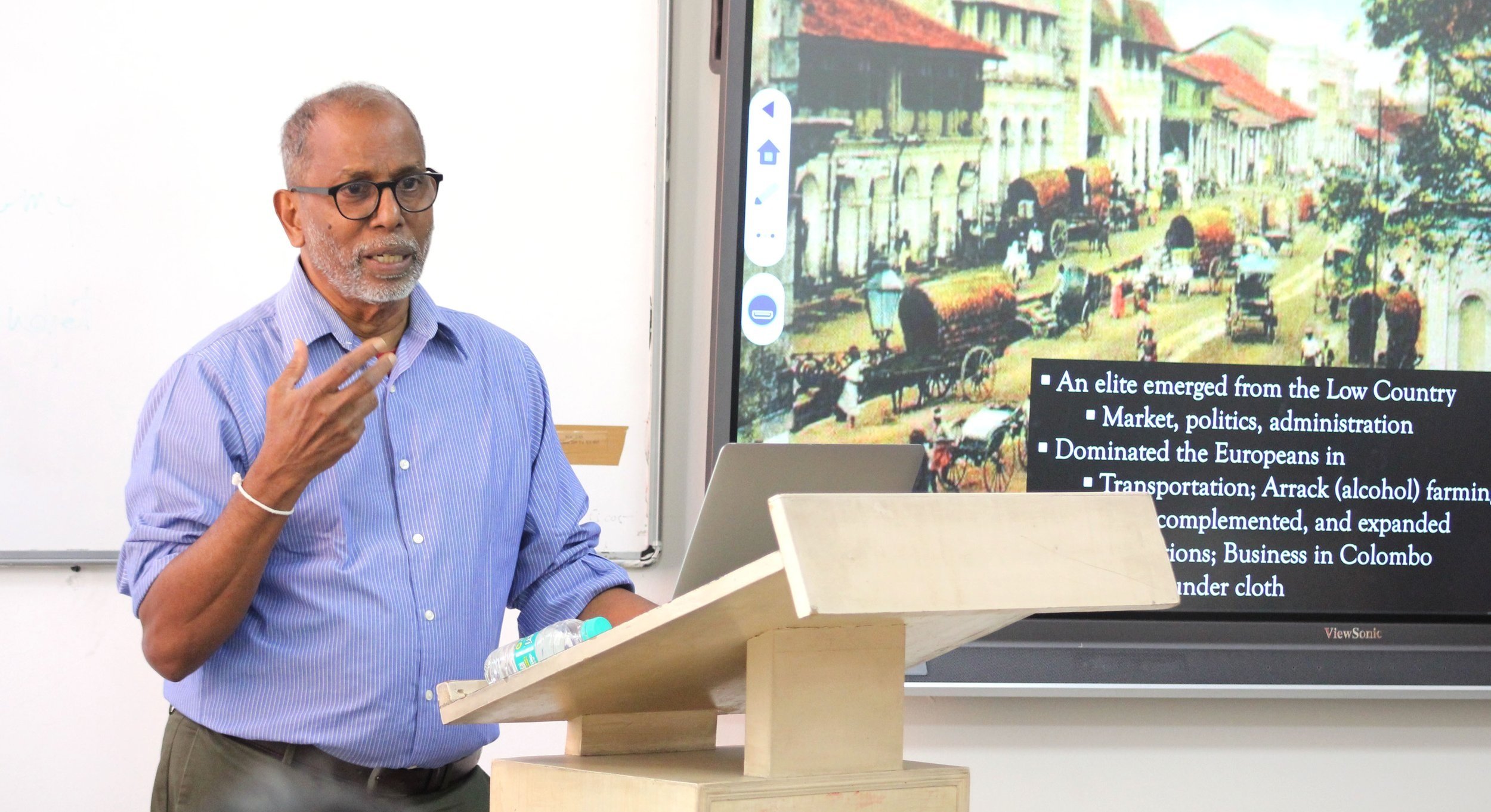
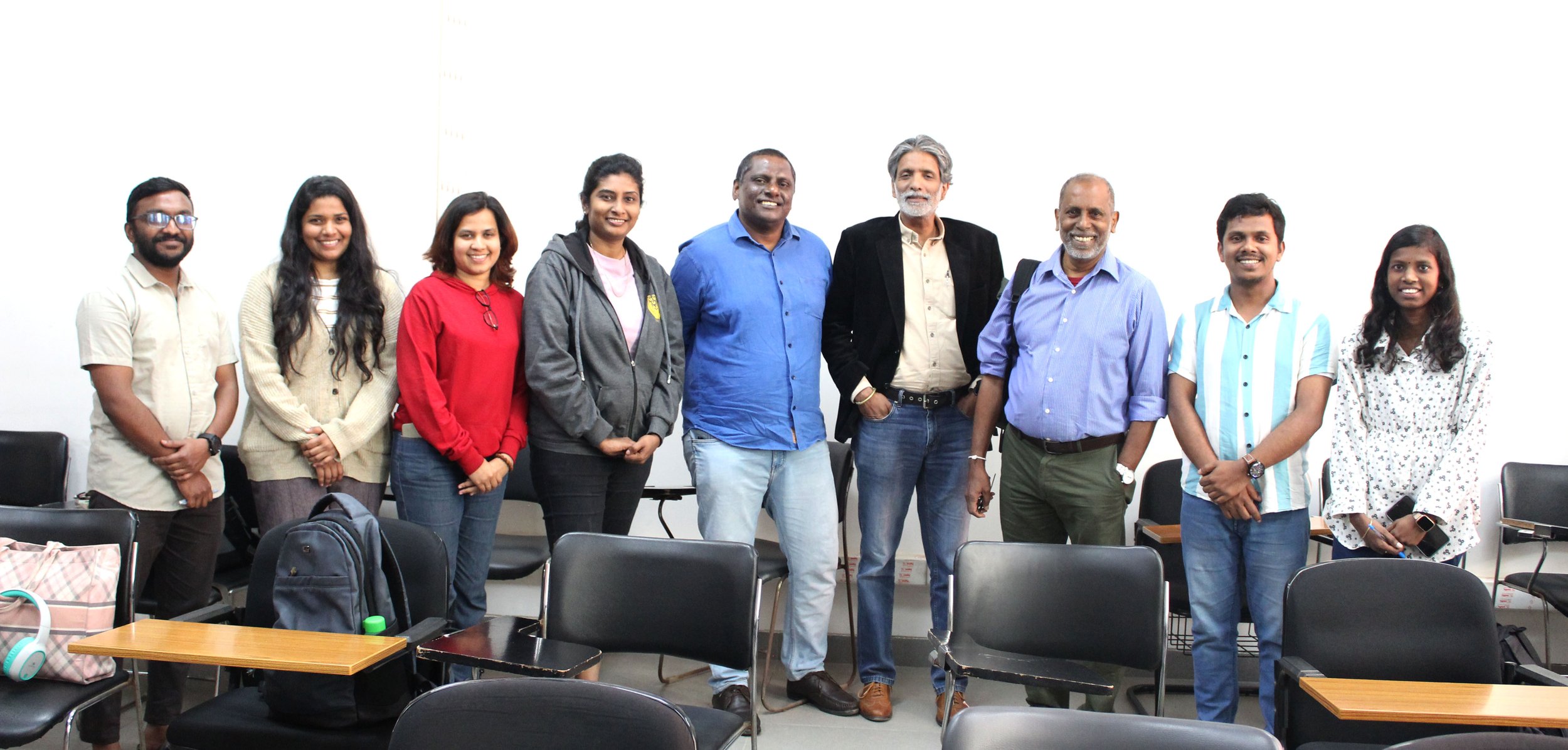
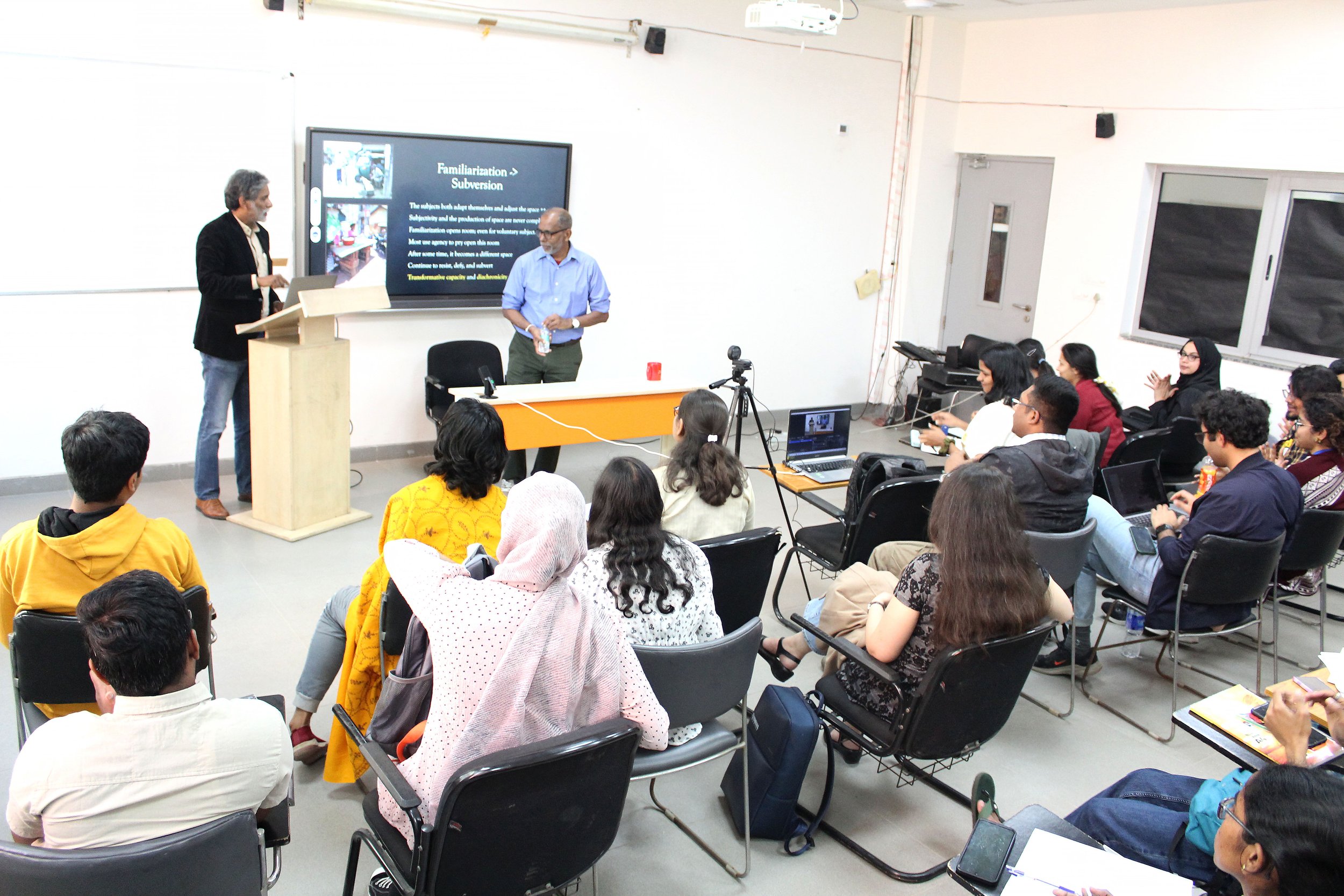
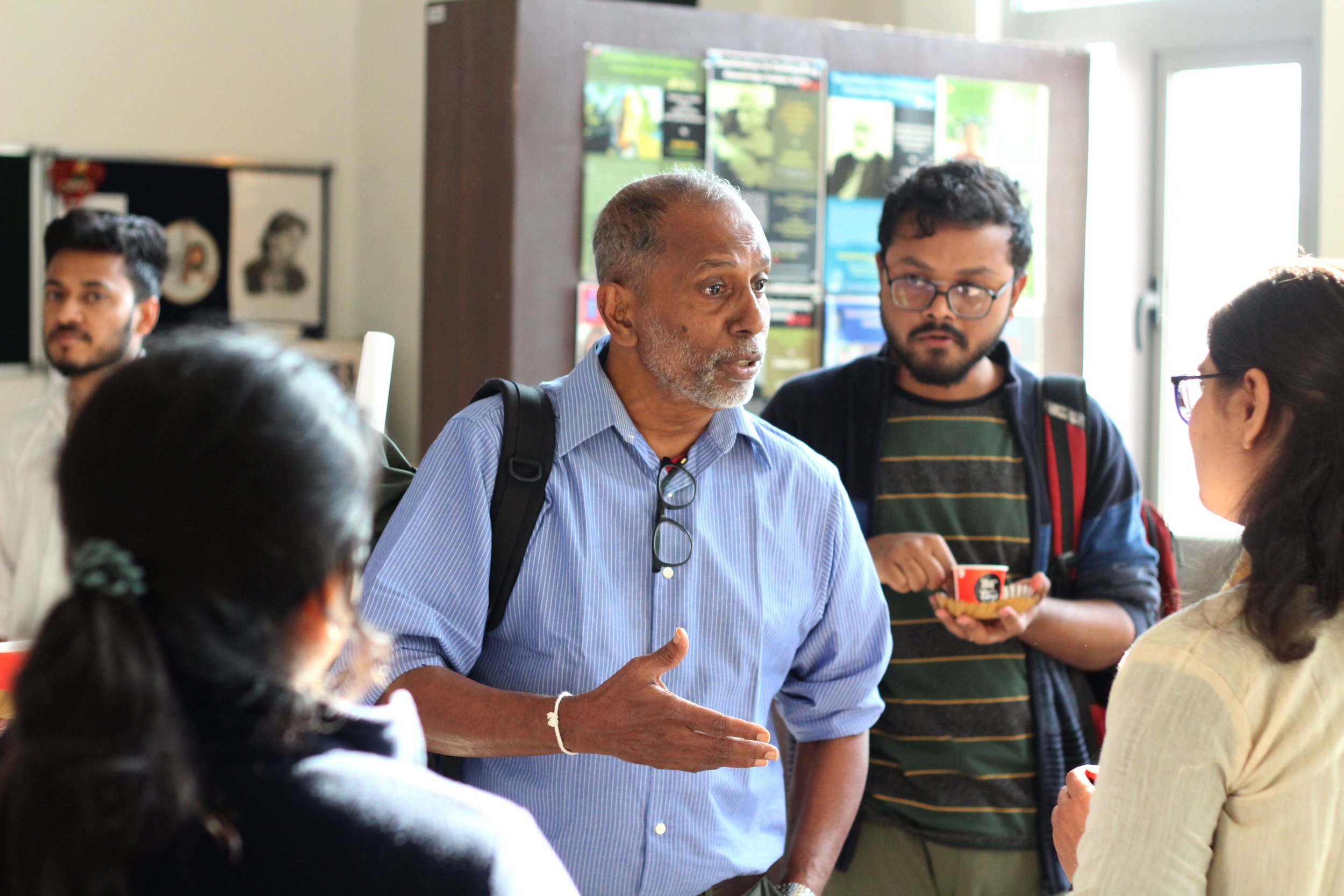
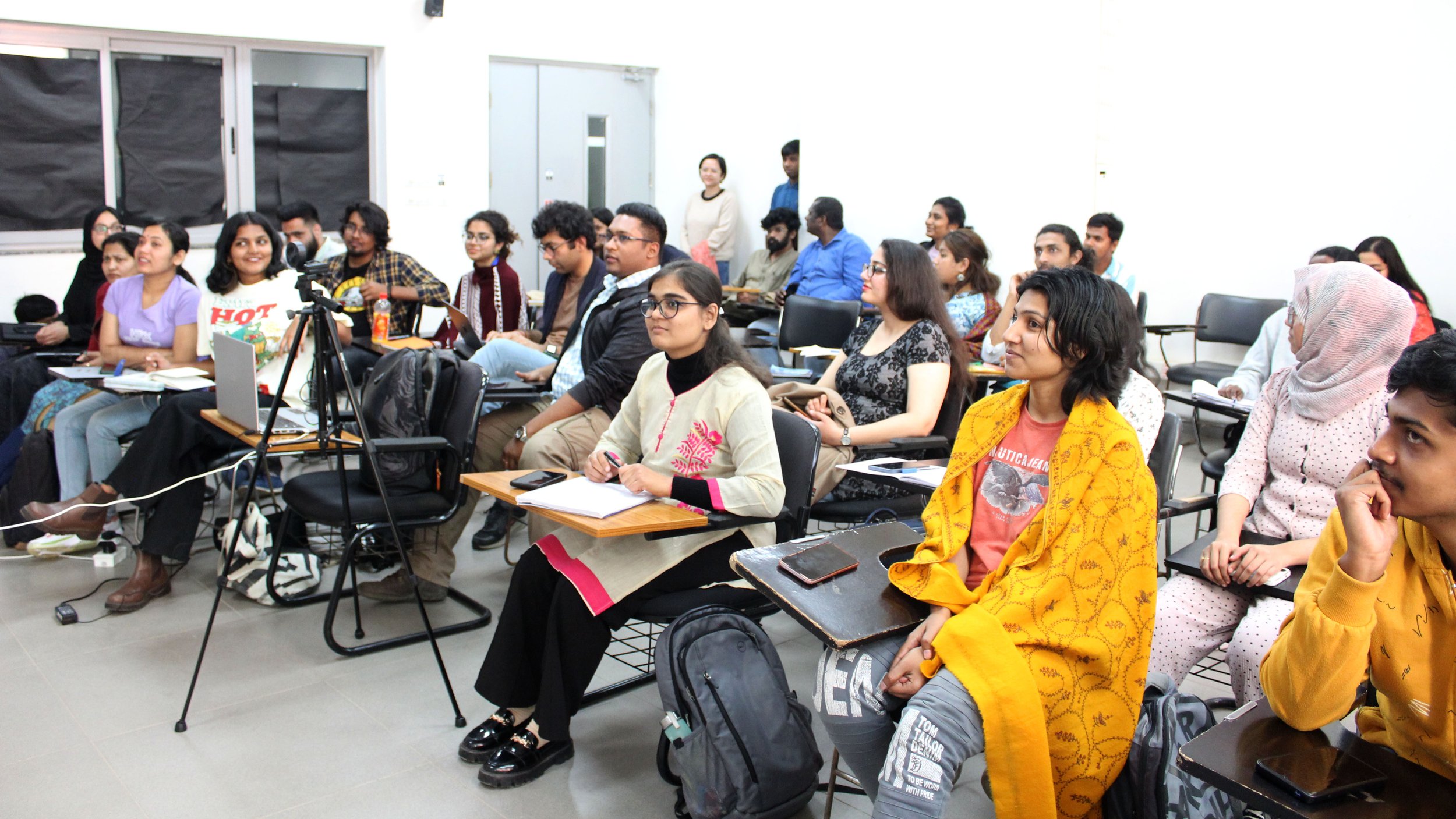
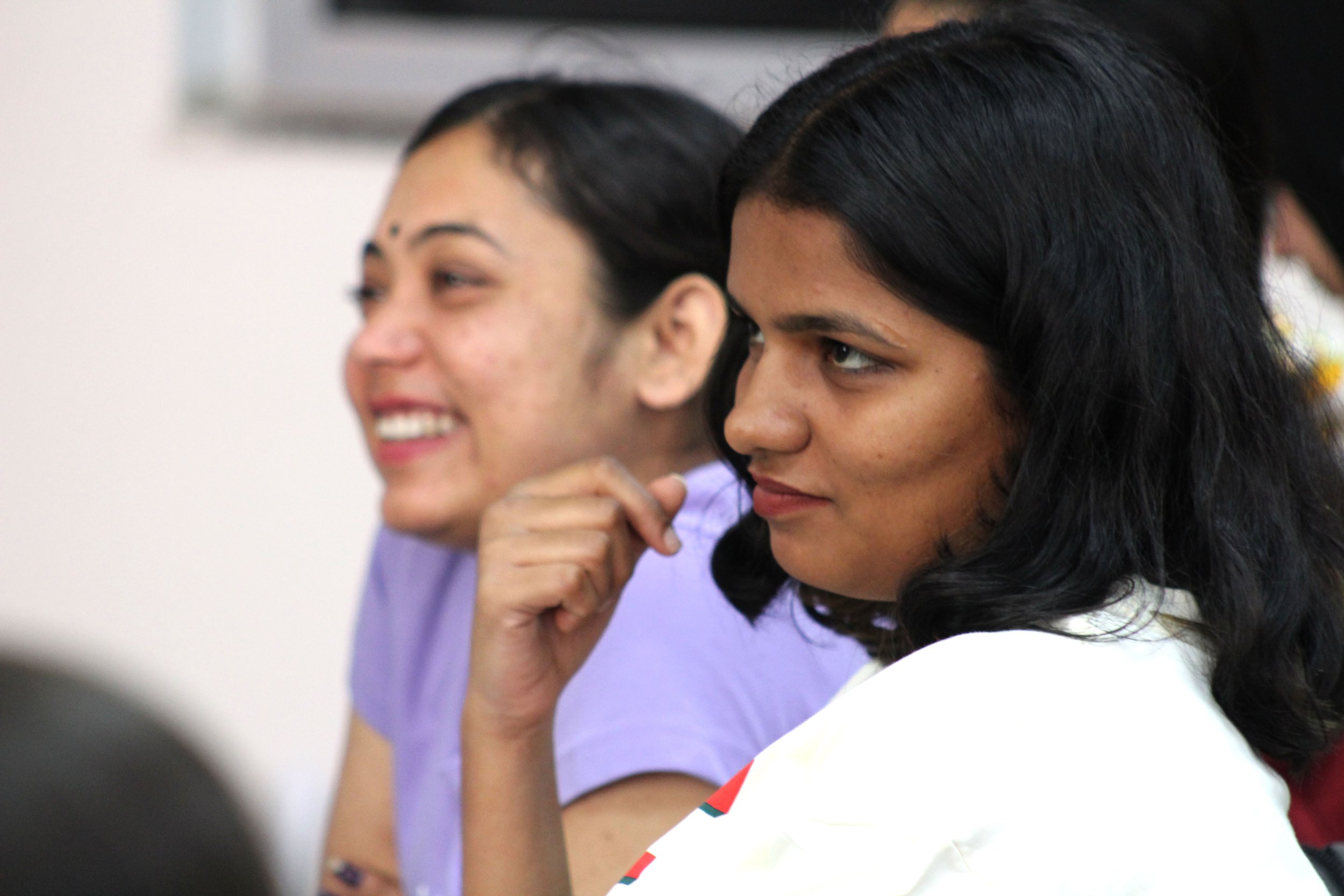
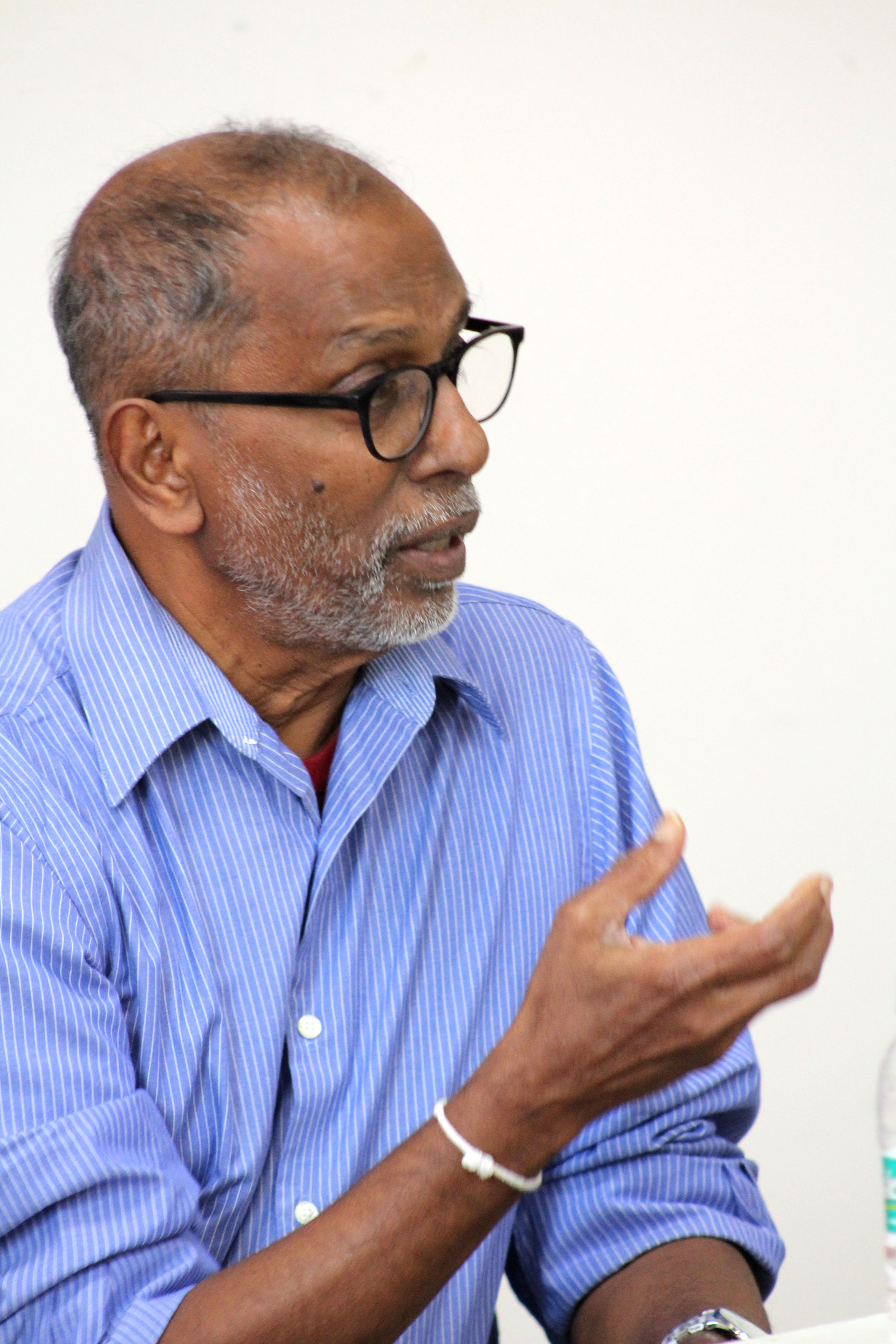
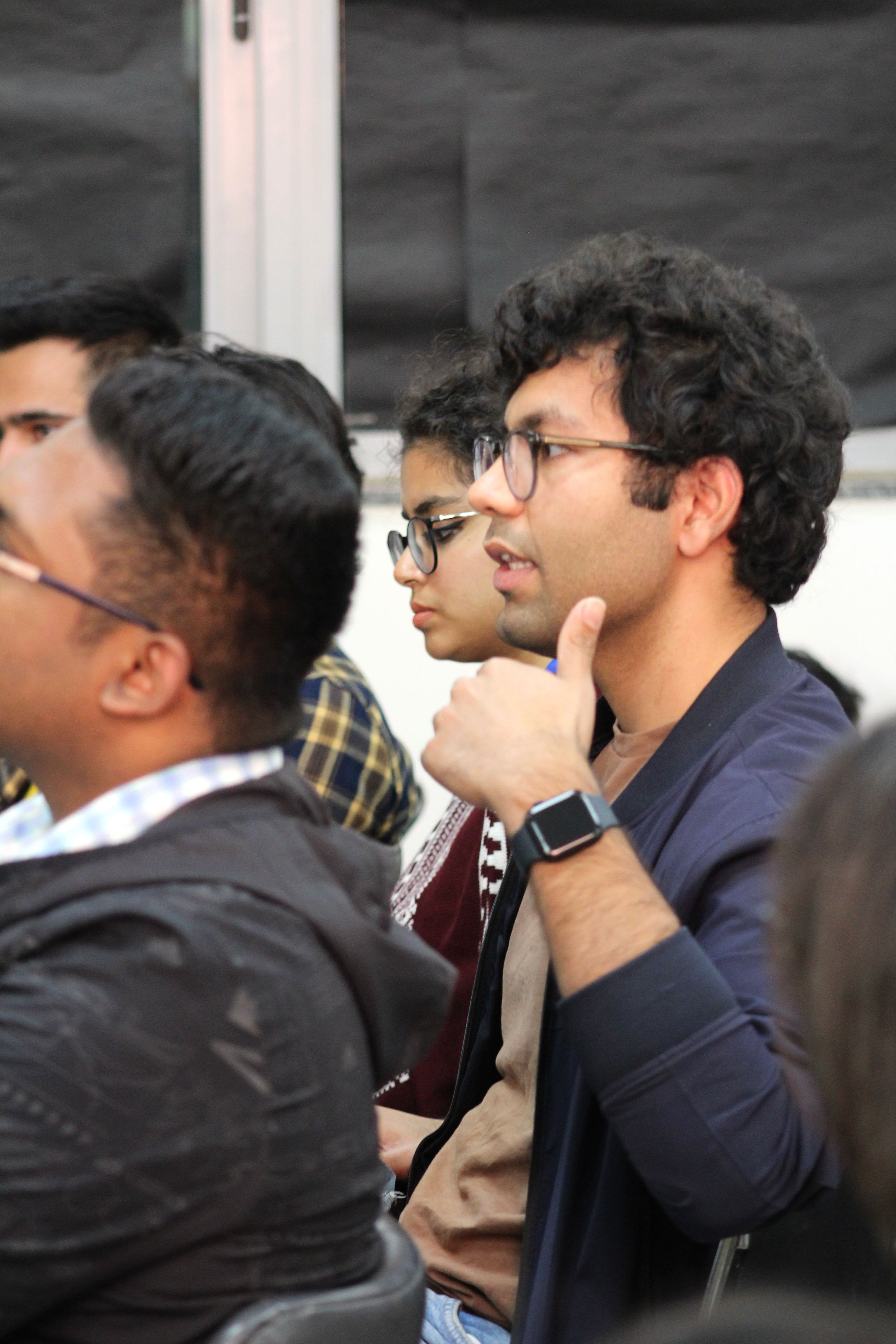
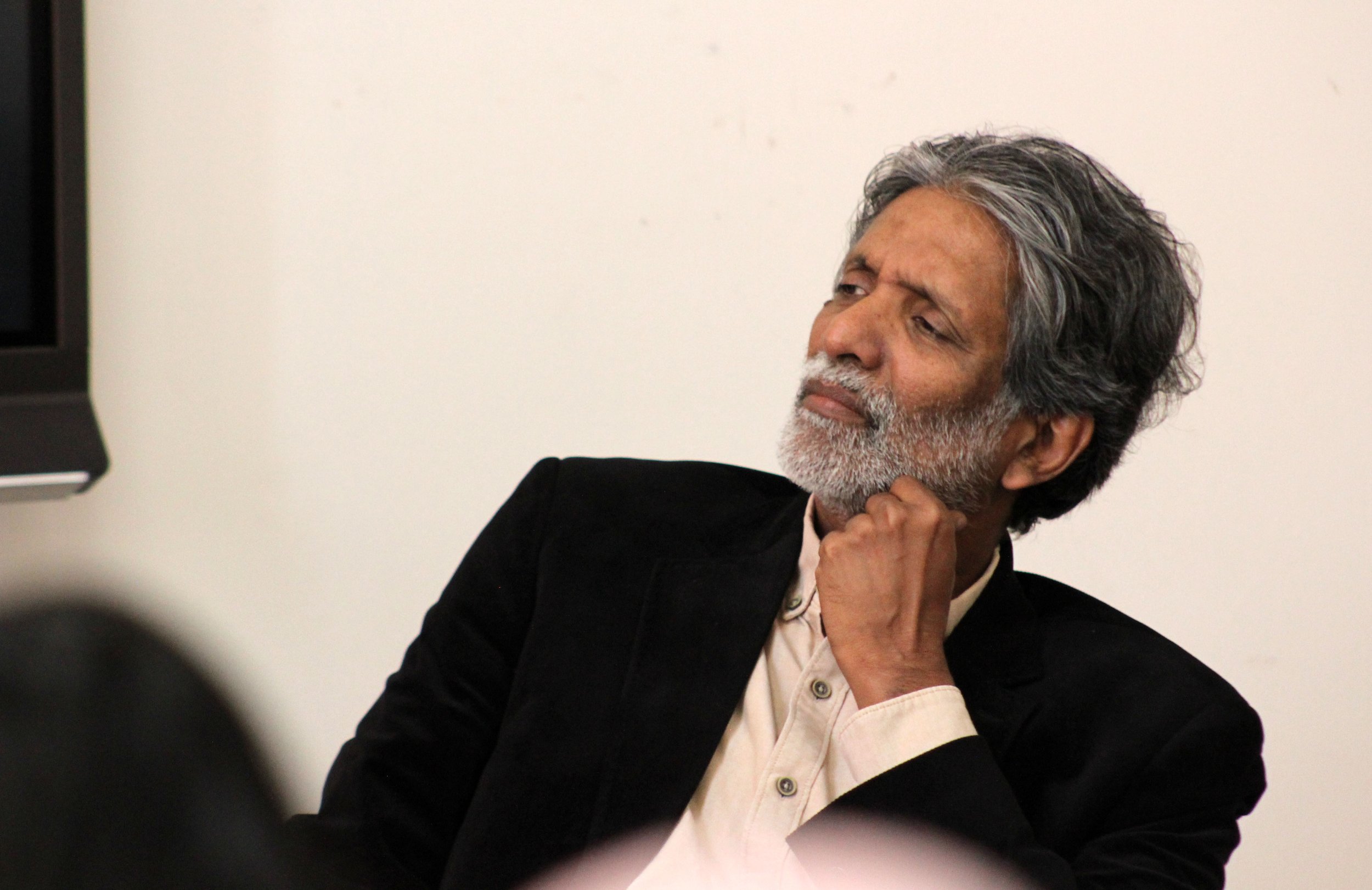
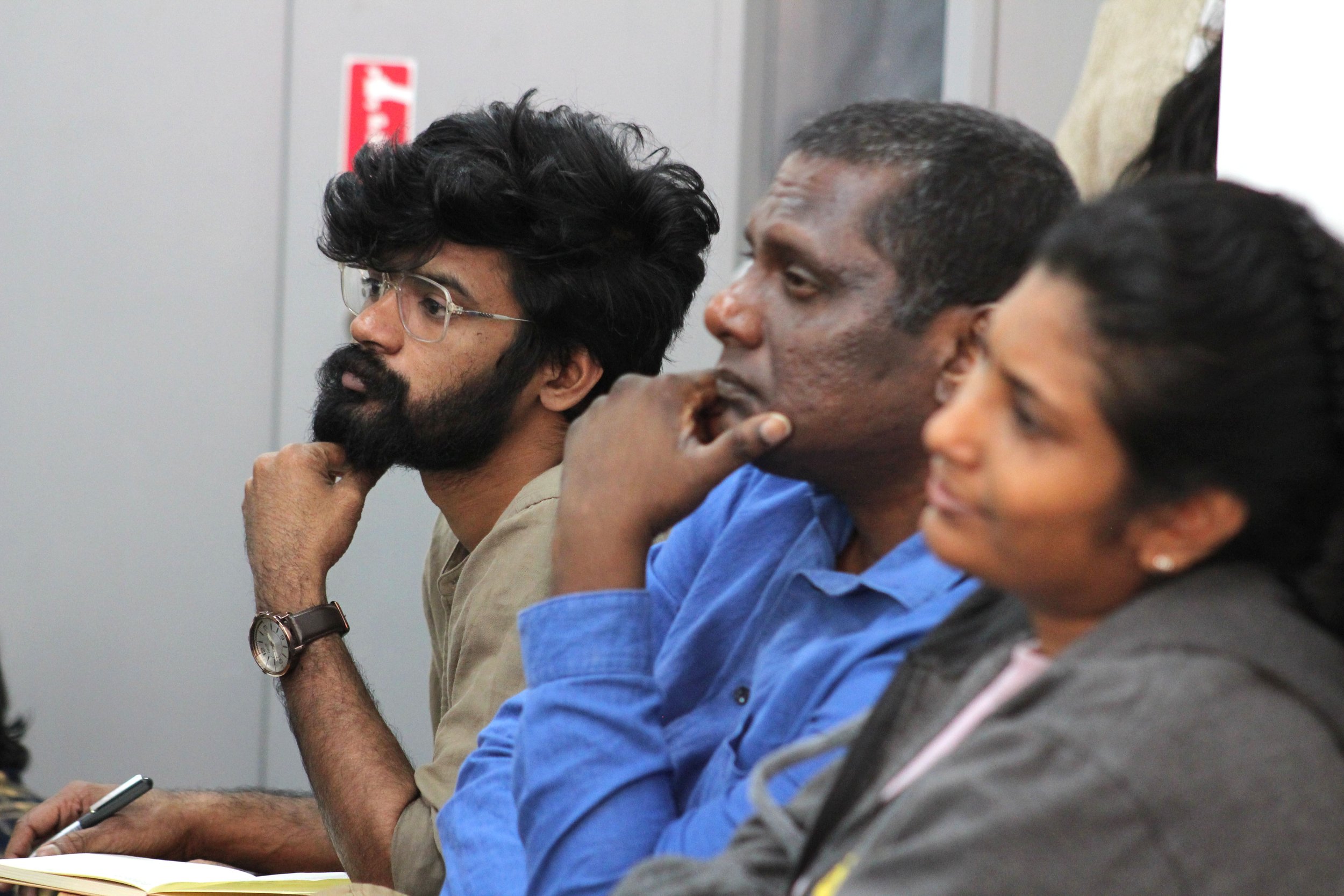
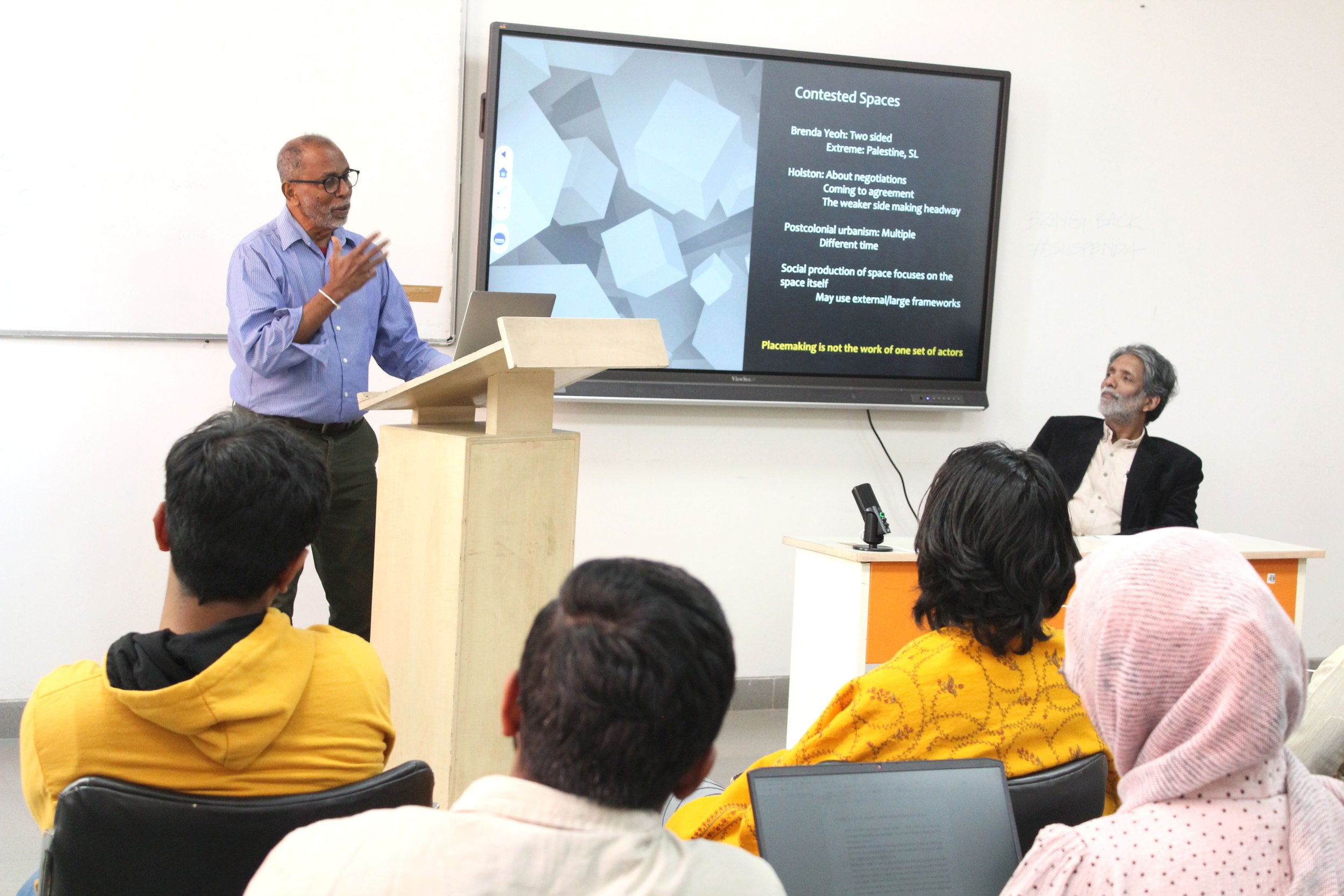
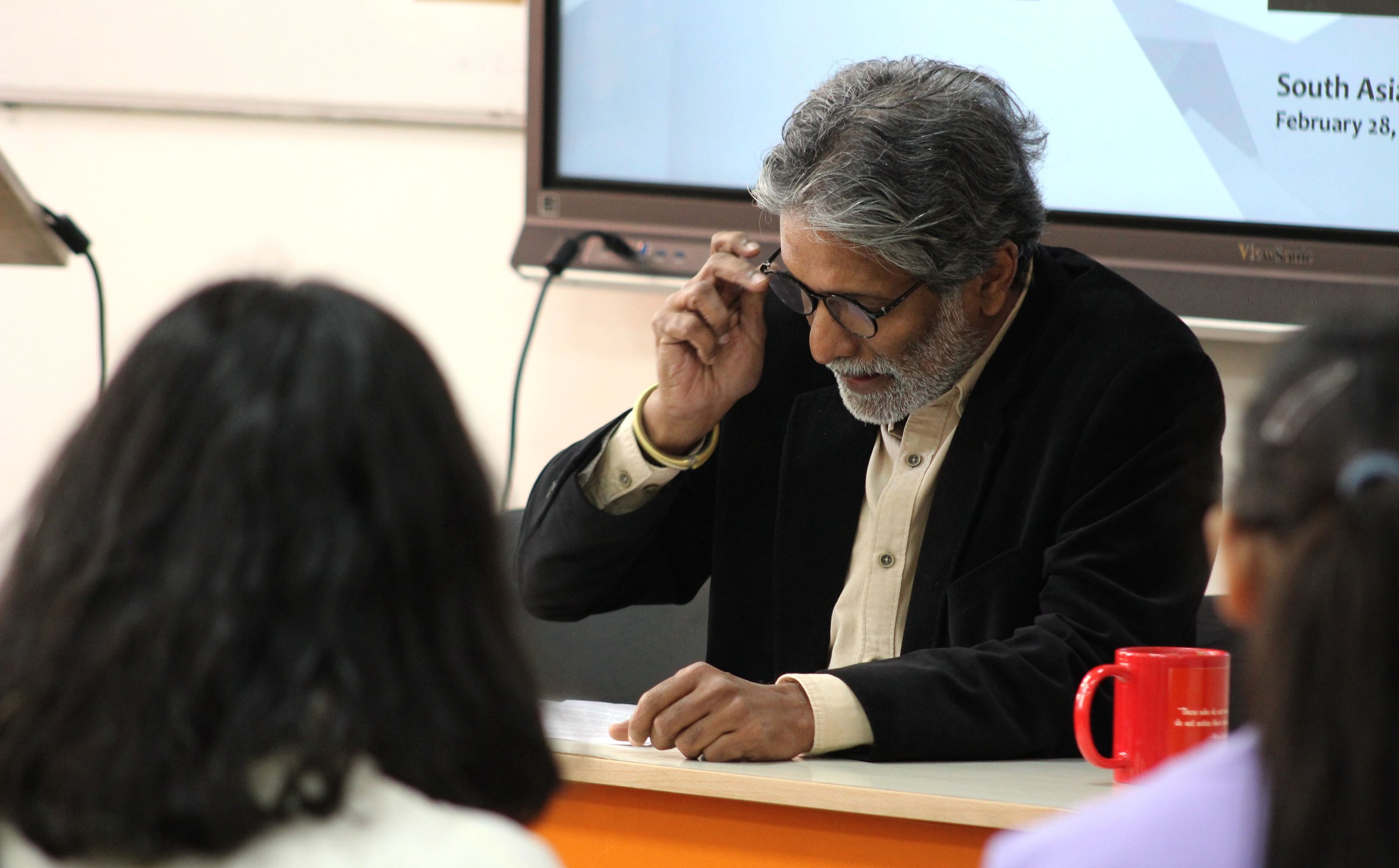
All photos of Nihal Perera’s lectures were taken by Aruna Jayasena, PhD candidate, Department of Sociology at South Asian University.
Reading Urban Space as a Contested Text: Towards a ‘Decolonized’ Approach to Place-making
Prof. Nihal Perera
Wednesday, February 28, 2024
2:30 pm–4:30 pm
Sociology Classroom ES 005, South Asian University, New Delhi (on-site)
Click to expand
Most countries in the world, including India and Sri Lanka, were European colonies where complexities of coloniality were imposed on the local inhabitants. Their contemporary urban systems did not evolve from their hinterlands but were created, as cities like Bombay, Colombo, Dhaka, Karachi, and Madras, were established as parts of larger imperial urban systems. In addition to building modern cities, urban systems, and spaces, the colonial powers imposed and helped the subjects internalize these as their own, causing epistemic subjugation. Hence the question: What are postcolonial developments?
By the late 1990s, scholars of ‘postcolonial urbanism’ demonstrated that space is both multivalent and contested. Nihal Perera (2016) demonstrates how the intended subjects negotiate imposed/provided spaces, creating room for their own everyday activities and cultural practices. To view these, we need to adopt intellectual approaches grounded in the places of the production of space, paying attention to local norms and interpretations. Professor Perera will demonstate how subjects reconcile the differences between the intended goals of imposed/provided spaces and ordinary people’s own understandings and expectations of these, thus creating spaces more friendly to their own activities.
Ethics and Positionality: Social Science Research on Sensitive Topics
Dr. Emiline Smith
Click to expand
Friday, March 31, 2023
9:00 AM 11:00 AM
Sociology Classroom 001, ES Building, South Asian University (on-site)
To contribute to the Heritage as Placemaking’s ongoing series on decolonization, HaP post-doctoral researcher Dr. Emiline Smith (Scottish Centre for Crime and Justice Research, University of Glasgow) gave a presentation at South Asian University that uses a criminological perspective to reflect on ethics, decolonization, and reflexivity when conducting social science research on sensitive topics. She advocates for an ethics of empathy as a framework for knowledge creation, use, and reproduction. The full abstract of the talk can be found in the accompanying poster.
August 15, 2022
Regenerating Buddhist Heritage through Community Action: A Case Study of Taxila
Dr. Nadeem Omar Tarar
12:00 GMT (13:00 CET; 17:30 IST; 17:45 NPT) / online
The official discourse on national heritage in Pakistan deploys the Buddhist archeological history of ancient Pakistan, weaved out of a selective appropriation of ancient history, as the binding elements of a national heritage. Built on the epistemology of colonial Anglophone archeology, this discourse works through a centralized bureaucracy and stringent patrimony laws and regulates the physical engagement of living communities with their material past. The Eurocentric global discourse on heritage, led by UNESCO, furthermore privileges professional archeological perspectives over any other claims to heritage and ascribes universal positive value to the Buddhist heritage of Pakistan.
Instead, taking the Buddhist archeological sites of Taxila on the World Heritage List as a case study in dissonant heritage management, Dr. Nadeem Omar Tarar’s lecture will highlight the gaps between the epistemology and ethics of Anglophone archeology with the material definition of heritage as sites, places, or monuments on the one hand, and the variety of beliefs, experiences, and rationales underlying non-professional engagement with the material past, such as illegal digging and counterfeiting of Gandhara antiquity on the other. Drawn from the oral history and archival records, he will also explore the process of public reclamation of the pre-Islamic history of Taxila, a site surrounded by a Muslim population but anchored in the Buddhist cultural past, as an integral part of local heritage, articulated through the adoption of the ancient name ‘Taxila’ for the newly emerging town in the 1960s and the reenactment of the ancient history of Taxila by local citizens through public exhibitions and popular festivals. He also explores how the rural, community-led initiative of Gandhara Resource Center Pakistan (GRCP) at Taxila serves as a conduit in the process of reclamation of Buddhist heritage by supporting a range of activities for remembering, commemorating, and communicating the Buddhist cultural heritage of Taxila.
Dr. Nadeem Omar Tarar is a historical anthologist, an author, and a public speaker. He holds the Gandhara Chair in Cultural Studies at the University of Wah, Pakistan. He has also worked at the National College of Arts, Lahore, and at the School of Oriental and African Studies, (SOAS), London. He serves as the International Council on Museums (ICOM) Pakistan's Board member for 2021-2024 and the Vice President, Council of Social Sciences (COSS) Pakistan. He is the founder member of Gandhara Resource Center Pakistan (GRCP), a dedicated institution in Taxila to create community awareness and engagement with heritage through documentation, publication, exhibitions, and cultural events. Dr. Tarar holds an MSc. Anthropology from Quaid Azam University, Islamabad, and MA in Critical Theory and Cultural Studies from University of Nottingham, UK. He holds a Ph.D. in Art History and Theory, University of New South Wales, Sydney, Australia, and Post-Doctoral Fellowship, Aga Khan Program for Islamic Architecture, MIT.
August 8, 2022
Asian Social Science and Decolonial-Pluralist Sociology: Lessons for South Asia
Dr. Siri Gamage
12:00pm CET (11:00am GMT, 3:30pm IST, 3:45pm NPT, 8:00pm AEST Australia) / online
As early as the 1970s, Syed Hussein Alatas argued that Asian social science is characterised by uncritical imitation of Western social science knowledge, theories and methods, to the extent that he articulated the concept of the Captive Mind. His view was that there is a 'demonstration effect' resulting from the wholesale provision of teaching and research materials by Western social scientists. Asian social scientists who obtain their training from Western higher education institutions tend to reproduce what they learn without adapting such knowledge and tools to their own context. He emphasized the need to selectively assimilate ideas from Western social science (European and American). More importantly, he argued for an autonomous Asian Social Science tradition plus an Asian sociology. In recent decades, other social scientists like Connell, Mignolo and Walsh, Bhambra, Julian Go and Sujata Patel have explained the need for postcolonial, decolonial or pluralist sociology using arguments based on southern theory and de-colonial thought. Others speak about constructing indigenous or autonomous sociology. In this talk, Dr. Siri Gamage will introduce arguments of these social scientists with a view to draw lessons for South Asian social science/sociology.
Dr. Siri Gamage’s research addresses a number of crucial intersections within the social sciences, including the idea of academic dependence, Eurocentrism, autonomous social science for global south/Asia, and decolonial/postcolonial sociology. He has worked as Senior Lecturer at the University of New England (Australia) and has most recently engaged in collaborative research in the School of Social Sciences and Psychology at Western Sydney University, Australia.
July 4, 2022
Space as localized histories, intergenerational marginalization, and resistance
Sheelasha Rajbhandari & Hit Man Gurung
12:00 GMT (13:00 CET; 17:30 IST; 17:45 NPT) / online
Chaired by Christiane Brosius
Within the Kathmandu Triennale, a central position is occupied by artists working within multiple aesthetic and cosmological perspectives and meanings, manifesting the multiplicities that construct our kaleidoscopic global reality. Theirs are practices that often have been systematically excluded from the realm of art and designated by a colonial ethnographic gaze as craft, folklore, or at best, "traditional" art, even if these practices are constantly evolving and embodying the traces of their contextual transformation and of this often- disobedient instability. In light of this, it is equally important to question what is categorized as heritage and who gets to decide what is worth preserving. It is difficult and complex to situate vernacular practices that have deep, localized histories and speak simultaneously of intergenerational marginalization and resistance. These ideas also percolated into the conceptualizations of the Pavilion of Nepal at the 59th Venice Biennale, where the intention was to reevaluate the very framework by which the Himalayan region gets fetishized by western, as well as nationalist, lenses. In contradiction to a mythical utopia envisioned in such ill-conceived visions is the reality of an intricately distinct and interconnected peoples who have repeatedly experienced displacement, loss, and the insurmountable task of reconstituting their lives.
Sheelasha Rajbhandari and Hit Man Gurung are founding members of ArTree Nepal and co-curators of the Kathmandu Triennale 2077 and the Pavilion of Nepal at the 59th Venice Biennale (2022)
Rajbhandari’s longitudinal curatorial research efforts are rooted in valuing quotidian and plural narratives by weaving folktales, oral histories, and rituals as juxtaposition to conventional historiography. Her art reclaims and recovers the somato-cosmic omnipresence of femininity through an intentional hodgepodge of memories, myths, and realities that intersperse and intersect time and space. Gurung’s various media of works are concerned with some of the most pressing socio-political, socio-economic and socio-cultural landscape of Nepal. In parallel, his art also speaks to the strong impact of global capitalism, the dramatic economic boom in the Middle East and Southeast Asia and their unprecedented investment in infrastructure development, leading to a high demand of cheap laborers; and consequently, stitching the various patterns of mass migrations seen in Nepal.
June 27, 2022
Liberators and encroachers: Banaras and the shifting meanings of heritage in new India
Dr. Vera Lazzaretti
12:00 GMT (13:00 CET; 17:30 IST; 17:45 NPT) / online
Dr. Vera Lazzaretti is researcher at the Centre for Research in Anthropology (CRIA) and ISCTE – University Institute of Lisbon, working on interreligious relationships and the politics of heritage and security in urban South Asia. Vera studied Philosophy and Cultural Anthropology and holds a Ph.D. in Indian and Tibetan Studies from the University of Turin. She previously worked at the University of Milan, the University of Oslo and the South Asia Institute in Heidelberg. Vera’s main field site is urban north India, and her research interests include the anthropology of space and place; religion and politics; heritage; security; interreligious violence; religious offense; pilgrimage; religious nationalism; and ethnography.
December 13, 2021
Thinking through nuances in decolonizing heritage
Dr. Neel Kamal Chapagain
12:00 GMT (13:00 CET; 17:30 IST; 17:45 NPT) / online
The idea of heritage can be argued both as a colonizing project and a product of colonization. Therefore, decolonizing heritage may mean a utopian aim as well as a process. At best, it is a wishful condition and a necessary process to refine the heritage idea in order to make it relevant to people. This talk will dwell on some observations on 'making of heritage' and 'doing heritage' to discuss the nuances of decolonizing heritage.
Dr. Neel Kamal Chapagain is Associate Professor and Director at Centre for Heritage Management, Ahmedabad University.


